‘Endless possibilities’: In academic affairs, Rodgers revels in new role
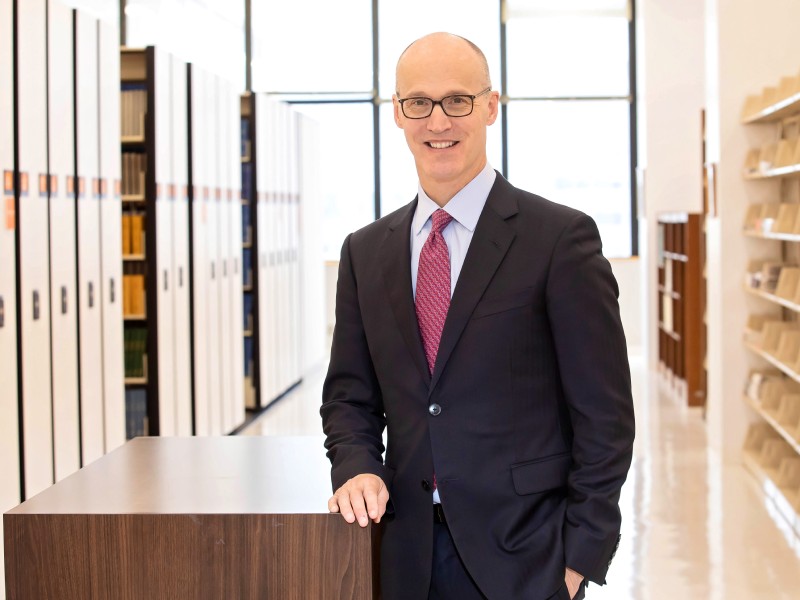
At times, it sounds like a job for a good psychiatrist.
A job for someone who has a mind for academics, but who is also schooled in the workings of the mind. If so, then it’s just the job for Dr. Scott Rodgers.
Leading the Office of Academic Affairs at the University of Mississippi Medical Center means you’re responsible for some 3,000 students, many of whom are wracked by struggles in the classroom and struggles of the heart; 1,200 faculty members whose interests and personalities may not always mesh; seven schools and their leaders, all facing their own challenges in meeting the needs of their students and teachers.
That’s the job Rodgers took on starting in April. After serving as chair of the Department of Psychiatry and Human Behavior at UMMC for more than seven years, he became associate vice chancellor for academic affairs, a position that, in many ways, reminds him of the one he filled for years before he arrived in Mississippi.
“It has been kind of like going back in time,” he said, “to do a job I absolutely love. The possibilities are unique and endless.”
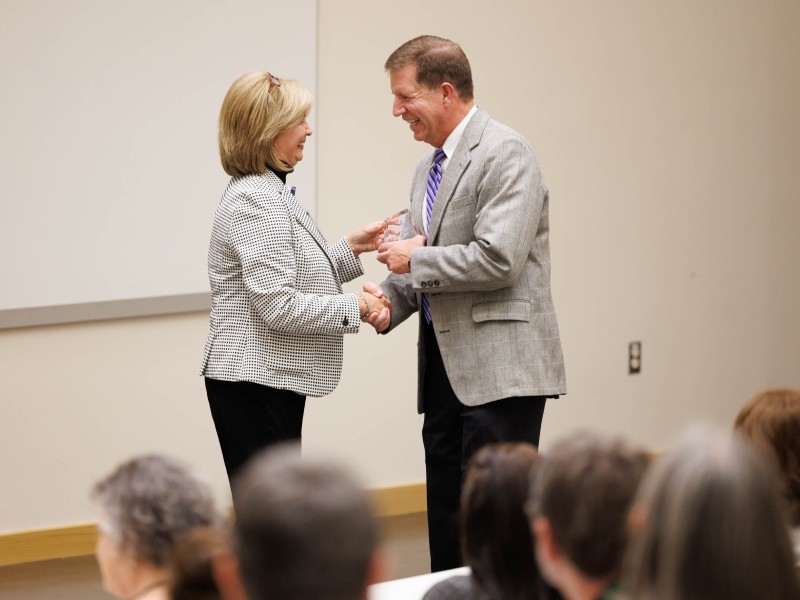
One possibility uppermost on his to-do list is bringing members of the faculty closer together. This goal strode closer to reality during a recent ceremony Rodgers called “a transformative event.”
On August 23, more than 80 faculty members were inducted into the brand-new Academy for Excellence in Education – “the beginning of a tangible, real-life community of educators at UMMC,” Rodgers said.
The inductees, celebrated teachers all, were drawn from the ranks of the Nelson Order. They are the inaugural members of a body committed to adding more names to that honor roll while also promoting and supporting outstanding educators, leaders, innovators and scholars for a long time to come.
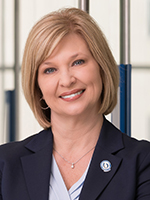
“To have our faculty be together like this and establish this sense of community will help pave the way for a lot of the work we want to do for our students,” said Dr. LouAnn Woodward, vice chancellor for health affairs and dean of the School of Medicine. “It is the heart of the faculty on this campus that makes it all worthwhile.
“I’m so delighted in the establishment of this academy,” she said during the ceremony. “I consider it an elite organization for the best of this group.”
It was a big moment for the academy’s creator, someone for whom “education is part of my identity.” That part was formed in his Georgia hometown.
Brought up in the Atlanta suburb of Decatur, this son, grandson and nephew of teachers absorbed high school calculus from his mom. Later, after earning degrees in zoology and German literature, Rodgers was true to his DNA. He taught sixth-grade science and coached middle school swim and track teams in Atlanta. But a long-stewing interest in the life of a physician, plus a scholarship, eventually steered him to medical school.
No one in his family had taught him how to be a doctor, though; he would be the first one. And he would be a pediatrician – he thought, until he realized he wanted to heal minds, too.
After earning his MD at Vanderbilt University, Rodgers entered Massachusetts General Hospital, Harvard Medical School, where he trained as a resident in psychiatry; he also completed a fellowship in child and adolescent psychiatry.
When Vanderbilt called him back, Rodgers returned to Nashville, joining a group of colleagues he found to be kind and accepting. He would stay there for more than 14 years. Later, he discovered that UMMC was also a place “where people can be themselves and feel supported.”
As a member of the Vanderbilt faculty, he accomplished a number of things that would support him one day as Woodward’s choice to lead academic affairs at UMMC. He developed learning courses that brought medical students and nursing students together, counseled future physicians trying to choose a specialty, and oversaw a Wellness Program that de-stressed and refreshed students.
For years, Rodgers served as associate professor of education and medical administration/psychiatry at Vanderbilt School of Medicine and associate dean of medical student affairs. Then, in December 2014, he arrived at UMMC: the new chair of the Department of Psychiatry and Human Behavior.
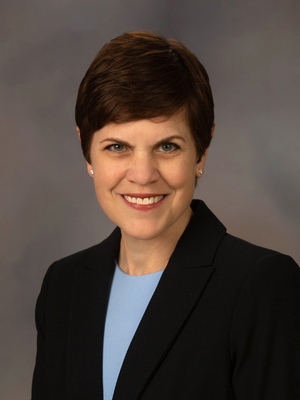
“The single most important contribution I made there was maintaining the excellence of that group and recruiting faculty and staff who make that department stand out,” he said. One of those faculty members, Dr. Sara Gleason, is Rodgers’ successor as interim department chair, “a towering talent who has the ability to keep the department on the right path,” Rodgers said.
Under Rodgers’ watch during his time as department chair, these things were born and/or prospered: research, the Center for Integrative Health, an addictions program, the state’s first multidisciplinary LGBTQ health clinic, and the Center for Advancement of Youth (CAY), where he still sees young patients every Thursday afternoon.
“Dr. Rodgers’ new role, in academic affairs, is a natural progression for him to share his talents, not just in one department, but with the broader Medical Center,” said Gleason, professor of psychiatry and human behavior.
“And his dedication to interprofessionalism is borne out with the academy he started.”
Now, Rodgers is working closely with Dr. Natalie Gaughf, UMMC’s assistant vice chancellor for academic affairs. “We have bonded,” Rodgers said.
“Academic affairs is full of very talented, high-functioning people, including Natalie. As I’ve gotten older, I’ve placed more and more emphasis on the importance of the team; Natalie will help us achieve our goals. She is a joy, a tremendous asset to the office, a great talent, and a role model to many.”
Gaughf, a licensed psychologist, has been a leader in various schools and departments for years at UMMC; she recently served as Interim Dean of the John D. Bower School of Population Health, just one of many positions she filled even while learning a new one.
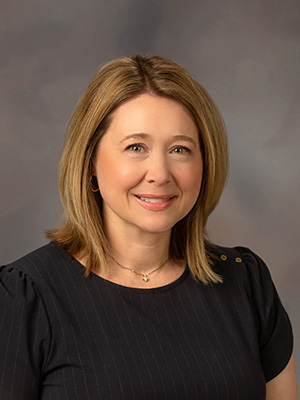
“One thing I’ve been very happy about is that Dr. Rodgers came in and quickly recognized the positive things academic affairs has done,” Gaughf said. “But he has also identified areas needing improvement.
“He has very high expectations; we like that in academic affairs.”
In that office, “we” means around 140 employees spread across a multitude of units or services, including student financial aid, academic information services (the Rowland Medical Library, for one), continuing education, student success and much more – even the bookstore and gift shop.
Rodgers expects he’ll have to work hard to follow the acts of two “legends,” he said: his predecessors, Dr. Helen R. Turner, associate vice chancellor emeritus of UMMC and the first woman to serve as the associate dean for academic affairs; and Dr. Ralph Didlake, director of the Center for Bioethics and Medical Humanities at UMMC.
If Rodgers’ education bona fides will serve him well in this challenge, so will the soul of a psychiatrist.
To lead, he said, “you must have a backbone that allows you to get things done. But psychiatry is a field that encourages compassion; that can be highly useful to an institutional leader, too.
“I’m easily able to empathize with people who have felt marginalized and excluded. And I see potential in people that they sometimes don't see themselves.”


